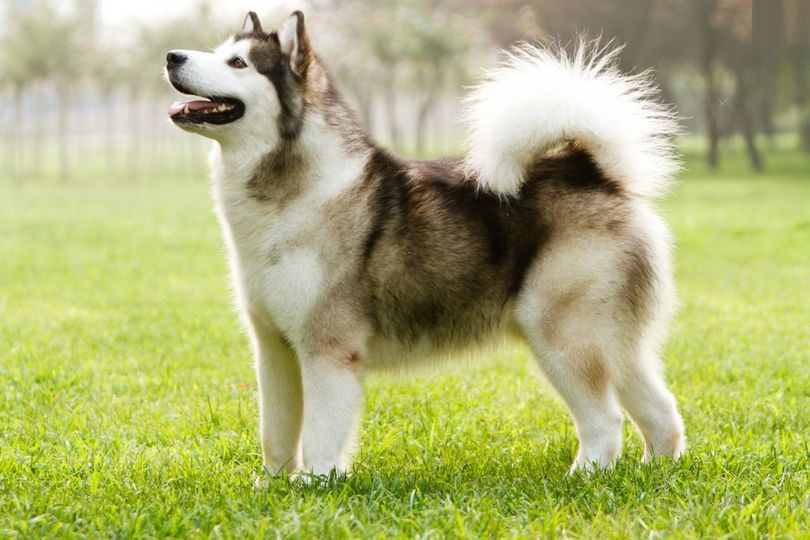Dog Breed
Canadian Eskimo Dog

- Full Name
- Canadian Eskimo Dog
- Alternate Names
- Greenland Dog
- Your PupScore
- Take the best dog breed quiz to get your Pup Scores!
- Life Span
- 10 - 15 years
- Weight
- 66 – 88 pounds
- Description
Affectionate, Intelligent, Loyal, Alert, Tough, Brave
- Origin
- Canada
- Bred For
- Work
- Attachments
- FCI Breed Standard
- Family Considerations
- Overall Ease of Breed
- Personality
- Home and Environment Considerations
- Physical Characteristics
Child Friendly
4/5
Is the Canadian Eskimo Dog good with children?
Yes, the Canadian Eskimo Dog is very friendly with children. We still recommend introductions to children while they are young so they get used to them, but the Canadian Eskimo Dog naturally loves children.
Stranger Friendly
4/5
Is the Canadian Eskimo Dog friendly with strangers?
Yes, the Canadian Eskimo Dog is very friendly with strangers. We still recommend early socialization while the Canadian Eskimo Dog is a puppy to introduce them to various new people, but in general they are friendly with everyone.
Dog Friendly
4/5
Is the Canadian Eskimo Dog friendly with other dogs?
Yes, the Canadian Eskimo Dog is very friendly with other dogs. We still recommend early socialization while the Canadian Eskimo Dog is a puppy to introduce them to various new dogs, but in general they are friendly with dogs as soon as they meet them.
Likes to Cuddle
3/5
Does the Canadian Eskimo Dog like to cuddle?
The Canadian Eskimo Dog likes to cuddle up every once in a while. They appreciate physical affection, but probably won't stay in your lap for extended amounts of time.
Playfulness
5/5
Does the Canadian Eskimo Dog like to play?
The Canadian Eskimo Dog is always ready for play! It's important to keep in mind, as they need to be stimulated with games and affection throughout the day.
Service Dog Ability
3/5
Does the Canadian Eskimo Dog make a good service dog?
The Canadian Eskimo Dog is not typically used as a service dog. There are always exceptions to the rule, but a service dog has to have many natural traits in addition to the proper training- smart, patient, and obsessed with pleasing their owner.
Ease for Novice
3/5
Is the Canadian Eskimo Dog good for first-time owners?
The Canadian Eskimo Dog is not the easiest breed for first-time owners, but can certainly still work out if the owner is willing to put the time into training and exercise.
Training Potential
4/5
How well can the Canadian Eskimo Dog be trained?
The Canadian Eskimo Dog can be trained very well. With discipline and a routine training program the Canadian Eskimo Dog can be incredibly well-trained.
Amount of Shedding
4/5
Does the Canadian Eskimo Dog shed a lot?
The Canadian Eskimo Dog sheds a lot! They may still shed less than a few other breeds, but be prepared for dog hair throughout the home and on your clothes.
Ease of Grooming
4/5
Is the Canadian Eskimo Dog easy to groom?
The Canadian Eskimo Dog requires some grooming, but less than the average dog breed. Typically you will not need to take the Canadian Eskimo Dog to the pet salon, and occasional combing at home should be enough.
Exercise Need
5/5
Does the Canadian Eskimo Dog need a lot of exercise?
The Canadian Eskimo Dog needs a daily exercise partner! The Canadian Eskimo Dog is best suited for a family where it will get plenty of daily exercise; it has so much energy that exercise is mandatory to avoid destructive behaviors.
Intelligence
4/5
How smart is the Canadian Eskimo Dog?
The Canadian Eskimo Dog is very smart. Above-average intelligence means they can pick up on cues and signals quickly when it comes to training. But it also means that they need to be challenged mentally, in addition to their standard exercise needs.
Amount of Barking
4/5
How much does the Canadian Eskimo Dog bark? Does the Canadian Eskimo Dog bark too much?
The Canadian Eskimo Dog barks a lot. This is important to consider with your living situation- will it be ok when you leave them at home alone or will they disrupt the neighbors? The Canadian Eskimo Dog will oftentimes bark just to express their thoughts... even just to be heard!
Guard Dog Ability
2/5
Is the Canadian Eskimo Dog a good guard dog?
The Canadian Eskimo Dog would not make a good guard dog. They can be alert, but typically do not have the desire or instinct to take on "guarding" as their job.
Tolerates Being Alone
1/5
Is the Canadian Eskimo Dog good at staying alone? Is the Canadian Eskimo Dog independent?
The Canadian Eskimo Dog considers their owner part of the "pack" and hates being left behind. This can be a good thing for someone looking for an emotional support dog who is loyal and always by their side, but bad if the dog will need to be left at home alone for extended periods.
Good for Apartment Living
2/5
Is the Canadian Eskimo Dog a good apartment dog?
The Canadian Eskimo Dog is not a good dog for apartment living for several reasons. It is still possible to make it work if the owner is dedicated to plenty of training and daily exercise, but it may be challenging.
Size
3/5
How big is the Canadian Eskimo Dog?
The Canadian Eskimo Dog is a medium sized dog breed. They can range in size depending on genetics, and males are larger on average than females.
Tolerates Heat
2/5
How much does the Canadian Eskimo Dog tolerate hot weather? When is it too hot for a Canadian Eskimo Dog?
The Canadian Eskimo Dog does not tolerate hot weather very well, and we would not recommend having a Canadian Eskimo Dog if you live in a very hot weather climate. At the minimum, they would need a home with air conditioning.
Tolerates Cold
5/5
How much does the Canadian Eskimo Dog tolerate cold weather? When is it too cold for a Canadian Eskimo Dog?
The Canadian Eskimo Dog does very well in cold weather, and loves the snow. They were built for it!
Potential to Run Away
5/5
Does the Canadian Eskimo Dog try to run away?
The Canadian Eskimo Dog has huge wanderlust, meaning that it's natural for them to want to run away. They are known as escape artists. It's important to test your yard and have a tall fence that cannot be jumped or climbed over. Sometimes the Canadian Eskimo Dog is not well suited for being off-leash, even if they are well trained.
General Health
4/5
Is the Canadian Eskimo Dog a healthy dog? The health of a Canadian Eskimo Dog should be measured not just by how many years they live, but also by how many health issues they've had. It is important to know which health conditions your breed is prone to- hip problems, eye problems, bloating, and arthritis are all common dog health problems.
The Canadian Eskimo Dog is very healthy, but it is still important to feed the Canadian Eskimo Dog high-quality food and to live a healthy lifestyle.
Energy Level
5/5
How energetic is the Canadian Eskimo Dog?
It seems like the Canadian Eskimo Dog never runs out of energy. If you are looking for a 5 AM run partner, the Canadian Eskimo Dog is your dog! A dog's energy level is one of the most important considerations when getting a new dog, and we would only recommend the Canadian Eskimo Dog for a family where it will get plenty of exercise.
Amount of Drooling
2/5
How much does the Canadian Eskimo Dog drool?
The Canadian Eskimo Dog drools very little, typically to where it's never a concern.
Prey Drive
4/5
Does the Canadian Eskimo Dog have a large prey drive? Does the Canadian Eskimo Dog like to chase birds, cats, and other small animals?
The Canadian Eskimo Dog has a high prey drive and has a natural tendency to chase after any small animal. Every case is unique, but the Canadian Eskimo Dog may not be the best dog for living with other cats or small animals.
Athleticism
4/5
Is the Canadian Eskimo Dog atheltic?
The Canadian Eskimo Dog is very athletic and would be well suited for a family that frequently works out or goes on adventures.
 Dog
Dog- Working
- Spitz
- Canadian Eskimo Dog
The Canadian Eskimo Dog is a purebred dog that belongs to the Spitz sub group, which falls under the larger Working dog breed group.
Working group: Working dogs encompass a wide range of different breeds- but they all were bred to assist people, so they are used to working hard. It is important for them to feel they have a "job" as their roles traditionally have varied from rescuing people to pulling sleds.
Because of their large size and intensity, they may be a handful for first time dog owners. On the other side, they can be trained well, so any owner who can exercise and dedicate to training their working dog, will be well rewarded. A common misconception may be that the working dog's jobs are only in physically challenging jobs; actually working dogs can also make excellent service dogs, since they are also kind and attentive to their owners.
Spitz sub-group: Spitz breeds are some of the dog world's most ancient dogs. They have a distinct wolf-like appearance with pointy ears, and a heavy double coat, and a big bushy tail that curls over the back. The majority of them are perfect for cold climates, as they originate from the Nordics, Russia, and Canada.
There are many spitz type of breeds, and sometimes it is debated which dogs are "true spitz" breeds. Spitz dogs love the outdoors and love adventure.
Canadian Eskimo Dogs for adoption
Similar Breeds

